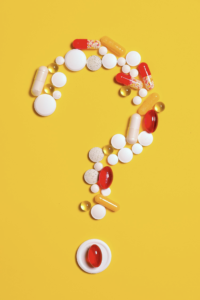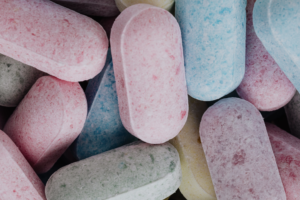
At the end of last month, on April 19, a meeting of the working group on specialized nutrition was held. The theme that united the participants of the event was the development of the project “Strategy for the development of the market for specialized food products and dietary supplements until 2030”.
The development of our industry will concern us until 2030 and beyond, so we will be happy to share with you the key points of the project discussions.

Let’s start with such a “pain” of the industry as fortification of the population.
Do Russians think they have the right diet? How many people take any vitamins and vitamin-mineral complexes, and what vitamins are considered the most popular?
The situation is best seen in numbers. On April 19, 2021, VTsIOM presented the results of a population survey on the above questions.
1600 residents of the Russian Federation over 18 years old took part.
It turned out that:
- 57% of Russians believe that a balanced diet is sufficient for the body to receive all the necessary vitamins and minerals. And less than half of the respondents, 41%, called their nutrition correct;
- 37% are convinced that the body does not receive enough nutrients with food, therefore it is important to use vitamins and minerals in various forms of release. Moreover, over two years, this part has grown by 5 pp. Among women, this opinion is shared by 46% of respondents, among men aged 25-34 – 44%;
- Over the past year, 52% of Russians have consumed any vitamins and minerals in various forms (compared to 2019, this figure increased by 14 pp. It is noted that this could be due to attempts to help immunity in a pandemic;
- 7% of Russians took vitamins on a regular basis throughout the year. 8% of respondents took vitamins in courses of 3-4 months. 22% – in courses of 1-2 months, and in this category 27% of women;
According to the results of the VTsIOM study, the most popular are D / D3 (24%), vitamin complexes (17%), vitamin C (12%), B vitamins (12%) and magnesium (11%).
And some more statistics. HOW people take vitamins:
- 51% of those surveyed consult a doctor before taking vitamins and vitamin-mineral complexes. These are mainly people over 60 (59%). 26% of respondents rely on their past experience, 15% – on the advice of others, and 14% – after advertising on the Internet or mentioning the product in the media. 10% relied on the advice of a pharmacist, and 10% had tests before taking vitamins;
- 58% of residents of the Russian Federation believe that vitamins cannot be taken without a doctor’s prescription. It is noted that 36% of respondents do not consider it necessary to consult a doctor before taking vitamins.
Representatives of the organization spoke with such statistics at the meeting (all tables and materials can be viewed in more detail at the link on the VTsIOM website: https://wciom.ru/analytical-reviews/analiticheskii-obzor/pandemija-uvelichila-potreblenie-vitaminov-2).
The issues of concern to the industry have been raised during the discussions and discussions. Briefly, the main problems can be defined as follows:

- Education of the population on the topic of fortification is not particularly carried out, and therefore people underestimate the importance of taking vitamins and vitamin-mineral complexes. For example, the representative of the commission on dietary supplements “Support of Russia” Ilya Mikin in his report cited the following figures: 90% of the adult population of Japan regularly use dietary supplements. In China – 67%, in the USA – 66%. In Russia, before the pandemic (according to IPSOS research), dietary supplements were consumed by only 15% of the adult population. But, according to the speaker, the pandemic has changed the attitude of Russians to the market of dietary supplements and vitaminization;
- The realities of our time are such that people really do not receive all the vitamins and microelements necessary for the body, and this is influenced by many factors. From malnutrition to ecology and climate;
- As noted by the doctor A.P. Prodeus, the role of immunity is not only the fight against viruses, but also the control of potential cancer cells that every person has. And in modern medicine, people begin to heal when they get sick, attaching little importance to lifestyle and nutrition;
- From a legal point of view, doctors have no right to recommend dietary supplements to a patient, because they are not a drug. Therefore, patients simply do not know who to turn to for advice;
- The issue of conducting industrial policy on the part of the state has matured: because the quality of vitamins, vitamin-mineral complexes and dietary supplements should be regulated, and this is especially true for online orders, when a buyer orders a product without quality guarantees;
- The GMP standard – quality control of medicinal products – does not apply to dietary supplements, although in developed countries this has been practiced since the beginning of the century.
Based on these problems, the participants in the meeting proposed the main solutions. Briefly, the essence is as follows:
- The problem needs to be solved starting from the society: to educate the population, and not only adults. People should understand what vitamins are vital for maintaining immunity, be aware of the risks of overdose and micronutrient deficiencies. In a nutshell – you need to conduct propaganda;
- Introduce mandatory labeling of food additives. According to the representative of the commission on dietary supplements Mikin, this year such a practice is being introduced as an experiment, and from 2022 it should become mandatory. Citizens need to know that the product is not falsified;
- Such departments as the Ministry of Industry and Trade and the Ministry of Agriculture should be puzzled by industrial policy, the quality standard of biological additives;
Other issues related to vulnerabilities in our industry were also discussed – for example, the inaccessibility of specialized therapeutic nutrition. We will definitely tell you about this in the next article.
See you on the SuperFood pages!

